Interim Budget: Economists Hail Realistic Fiscal Numbers
By Rediff Money Desk, NEWDELHI Feb 01, 2024 15:45
Economists praise India's interim budget, highlighting the government's commitment to fiscal consolidation and realistic deficit projections. Experts see this as a positive sign for economic growth and stability.
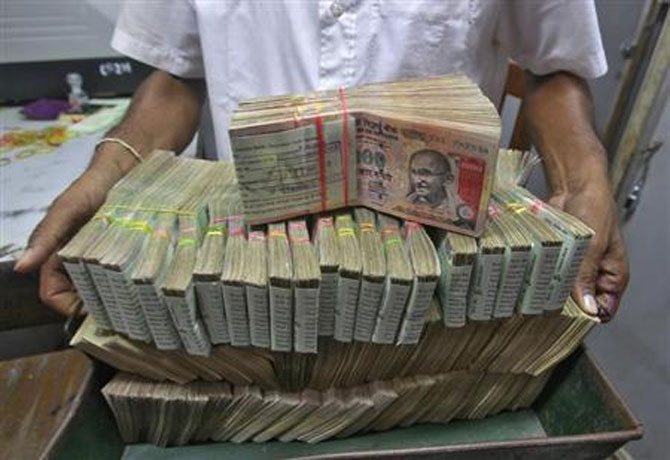
Mumbai, Feb 1 (PTI) Analysts and economists have hailed the fiscal projections in the interim Budget, saying the lower fiscal deficit forecast shows that the government, even in an election year, is serious about fiscal consolidation and that the numbers look achievable.
According to Devendra Kumar Pant, the chief economist at India Ratings, the two broad themes of the interim Budget are fiscal consolidation and stepping up focus on agriculture/rural to course correct, to some extent, the differential benefits of the ongoing economic growth that's tilted in favour of upper-income bracket/urban households.
The projected fiscal deficit numbers for FY24 and FY25 suggest that the government is serious about achieving the fiscal consolidation path of 4.5 per cent fiscal deficit by FY26, and given the nominal GDP growth assumption and revenue buoyancy, the target appears plausible, Pant said in a note.
The net market borrowing of Rs 11.75 lakh crore in FY25 augurs well for the bond market and is likely to have a favourable impact on 10-year G-sec yields, he added.
Aditi Nayar, the chief economist at Icra Ratings, said the higher than expected capex (Rs 10 lakh crore vs Rs 9.3 lakh crore for FY24, and Rs 11.1 lakh crore vs 10.2 lakh crore for FY25; and lower than projected fiscal deficit of 5.8 per cent for FY24 vs 6 per cent earlier, and 5.1 per cent for FY25 vs 5.3 per cent seen earlier) suggest that the quality of expenditure is going to be healthier than earlier.
Faster fiscal consolidation and a dip in borrowings will help cool GSec yields further over the coming year, as long as the estimates for revenue and capital receipts appear credible as the year progresses, she added.
The revised FY24 budget estimate has indicated higher central tax devolution compared to the budget estimate. This implies that Rs 3.6 lakh crore will be released in Q4, which is 5 per cent higher year-on-year, which provides a further downside to state bond issuance in the current quarter, which was indicated at Rs 4.1 lakh crore, she said.
Yezdi Nagporewalla, chief executive at KPMG India, the interim Budget has ensured to not be swayed by short-term political compulsions and ensuring to keep the fiscal deficit in check. It also shows the government's seriousness about treading on the green growth path commitment to equitable and inclusive growth focusing on the poor, women, youth and farmers, infrastructure development and fiscal prudence. These are likely to create new opportunities, uplift demand, and unlock multipliers for the economy.
And the biggest highlight is fiscal rectitude with fiscal deficit estimate for FY25 at 5.1 per cent, he added.
According to Radhika Rao, senior economist at DBS Bank, the interim Budget has prioritised pragmatism over populism by focusing on higher capex and faster fiscal consolidation. The math not only projects a better-than-budgeted deficit target for FY24 but also pegs the FY25 goalpost at a narrower 5.1 per cent against expectations of 5.3-5.4 per cent.
By extension, gross and net borrowings are much lower than FY24, giving significant relief to the debt market, which will help keep a lid on the cost of borrowing and crowd-in the private sector. Despite the welfare focus on women, youth, poor as well as farmers, the government has refrained from outright populism, while maintaining a continued emphasis on capex to improve the quality of spending, Rao said.
According to Devendra Kumar Pant, the chief economist at India Ratings, the two broad themes of the interim Budget are fiscal consolidation and stepping up focus on agriculture/rural to course correct, to some extent, the differential benefits of the ongoing economic growth that's tilted in favour of upper-income bracket/urban households.
The projected fiscal deficit numbers for FY24 and FY25 suggest that the government is serious about achieving the fiscal consolidation path of 4.5 per cent fiscal deficit by FY26, and given the nominal GDP growth assumption and revenue buoyancy, the target appears plausible, Pant said in a note.
The net market borrowing of Rs 11.75 lakh crore in FY25 augurs well for the bond market and is likely to have a favourable impact on 10-year G-sec yields, he added.
Aditi Nayar, the chief economist at Icra Ratings, said the higher than expected capex (Rs 10 lakh crore vs Rs 9.3 lakh crore for FY24, and Rs 11.1 lakh crore vs 10.2 lakh crore for FY25; and lower than projected fiscal deficit of 5.8 per cent for FY24 vs 6 per cent earlier, and 5.1 per cent for FY25 vs 5.3 per cent seen earlier) suggest that the quality of expenditure is going to be healthier than earlier.
Faster fiscal consolidation and a dip in borrowings will help cool GSec yields further over the coming year, as long as the estimates for revenue and capital receipts appear credible as the year progresses, she added.
The revised FY24 budget estimate has indicated higher central tax devolution compared to the budget estimate. This implies that Rs 3.6 lakh crore will be released in Q4, which is 5 per cent higher year-on-year, which provides a further downside to state bond issuance in the current quarter, which was indicated at Rs 4.1 lakh crore, she said.
Yezdi Nagporewalla, chief executive at KPMG India, the interim Budget has ensured to not be swayed by short-term political compulsions and ensuring to keep the fiscal deficit in check. It also shows the government's seriousness about treading on the green growth path commitment to equitable and inclusive growth focusing on the poor, women, youth and farmers, infrastructure development and fiscal prudence. These are likely to create new opportunities, uplift demand, and unlock multipliers for the economy.
And the biggest highlight is fiscal rectitude with fiscal deficit estimate for FY25 at 5.1 per cent, he added.
According to Radhika Rao, senior economist at DBS Bank, the interim Budget has prioritised pragmatism over populism by focusing on higher capex and faster fiscal consolidation. The math not only projects a better-than-budgeted deficit target for FY24 but also pegs the FY25 goalpost at a narrower 5.1 per cent against expectations of 5.3-5.4 per cent.
By extension, gross and net borrowings are much lower than FY24, giving significant relief to the debt market, which will help keep a lid on the cost of borrowing and crowd-in the private sector. Despite the welfare focus on women, youth, poor as well as farmers, the government has refrained from outright populism, while maintaining a continued emphasis on capex to improve the quality of spending, Rao said.
DISCLAIMER - This article is from a syndicated feed. The original source is responsible for accuracy, views & content ownership. Views expressed may not reflect those of rediff.com India Limited.
You May Like To Read
TODAY'S MOST TRADED COMPANIES
- Company Name
- Price
- Volume
- GTL Infrastructure
- 2.93 ( -4.87)
- 226206286
- IFL Enterprises
- 1.30 (+ 4.84)
- 81461564
- Vodafone Idea L
- 16.79 (+ 0.66)
- 67447398
- NCL Research
- 0.95 ( -4.04)
- 31996628
- Franklin Industries
- 3.73 (+ 3.32)
- 21511209
MORE NEWS

Navi Mumbai Airport ILS Signal Testing Begins
The Airports Authority of India (AAI) has begun ILS signal testing at the...

Air India VRS for Non-Flying Staff Ahead of...
Air India has announced a voluntary retirement scheme (VRS) and voluntary separation...
Fisher Groups Oppose WTO Fisheries Subsidy Talks
Small-scale fisher groups from India, Indonesia, and Bangladesh demand WTO keep...




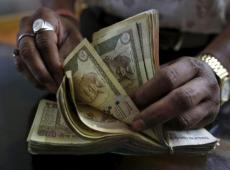

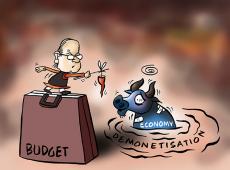


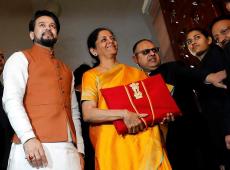
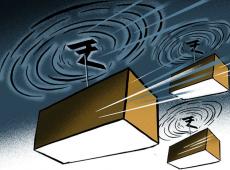

 © 2024 Rediff.com India Limited. All rights reserved.
© 2024 Rediff.com India Limited. All rights reserved.